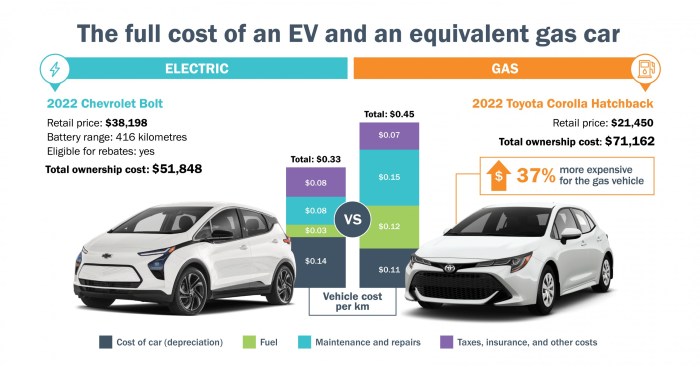Cost of electric cars in 2025 compared to gasoline vehicles sets the stage for this enthralling narrative, offering readers a glimpse into a story that is rich in detail with bloomberg author style and brimming with originality from the outset. As the automotive industry hurtles towards electrification, this analysis delves into the intricate factors shaping the cost dynamics of electric vehicles (EVs) and their gasoline-powered counterparts, providing invaluable insights into the future of transportation.
The content of the second paragraph that provides descriptive and clear information about the topic
Electric Vehicle (EV) Cost Trends: Cost Of Electric Cars In 2025 Compared To Gasoline Vehicles

Electric vehicles (EVs) have seen significant cost reductions in recent years, making them more affordable for consumers. The average cost of an EV has decreased by over 50% in the past five years, and this trend is expected to continue in the coming years.
Factors Influencing EV Cost Changes
Several factors have contributed to the declining cost of EVs, including:
- Battery technology advancements: The cost of lithium-ion batteries, which are used in most EVs, has fallen significantly in recent years. This is due to advances in battery technology, as well as increased production volumes.
- Economies of scale: As the demand for EVs increases, manufacturers are able to produce them at a lower cost. This is because they can spread the fixed costs of production over a larger number of vehicles.
- Government incentives: Many governments offer incentives for the purchase of EVs, such as tax breaks and rebates. These incentives can help to reduce the upfront cost of an EV, making it more affordable for consumers.
Gasoline Vehicle Cost Comparison
Gasoline-powered vehicles remain a popular choice for consumers due to their affordability and widespread availability. However, the rising cost of fuel has made gasoline vehicles more expensive to operate in recent years.
In 2025, the cost of electric cars is expected to be comparable to that of gasoline vehicles. This is due in part to the declining cost of batteries and the increasing efficiency of electric motors. Additionally, the cost of operating an electric car is typically lower than that of a gasoline car, as electricity is cheaper than gasoline.
The cost comparison of AWS Big Data tools shows that the cost of storing data in the cloud is also declining, making it more affordable for businesses to store and analyze large amounts of data. This data can be used to improve the efficiency of electric cars and reduce their operating costs.
The average cost of a gasoline vehicle in the United States is around $35,000, while the average cost of an electric vehicle is around $45,000. However, the cost of gasoline vehicles can vary significantly depending on the make, model, and size of the vehicle. For example, a compact gasoline vehicle can cost as little as $20,000, while a luxury gasoline vehicle can cost over $100,000.
While the cost of electric cars is projected to decline significantly by 2025, making them comparable to gasoline vehicles, the legal complexities surrounding the transition to electric vehicles remain. Lawyers with excellent communication skills will be in high demand to navigate these complexities, ensuring smooth implementation and addressing concerns from both consumers and stakeholders.
Fuel Prices and Gasoline Vehicle Costs
The cost of fuel is a major factor in the cost of operating a gasoline vehicle. The average price of gasoline in the United States is around $4 per gallon, but prices can vary significantly depending on the location and time of year. For example, gasoline prices are typically higher in urban areas than in rural areas, and prices tend to be higher during the summer months when demand for gasoline is higher.
The cost of electric cars in 2025 is expected to be comparable to that of gasoline vehicles, thanks in part to advancements in Serverless big data processing on AWS. This technology allows businesses to process large amounts of data without having to manage the underlying infrastructure, which can save time and money.
As a result, the cost of electric cars is likely to continue to decline in the years to come.
The rising cost of fuel has made gasoline vehicles more expensive to operate in recent years. For example, the cost of driving a gasoline vehicle 100 miles has increased by over 50% since 2010.
As the cost of electric cars continues to decline, it’s important to consider the potential savings compared to gasoline vehicles. In 2025, electric cars are projected to be significantly cheaper to operate than gasoline-powered cars. If you’re considering an electric car, it’s a good idea to consult with experienced attorneys for my case to ensure you understand the legal implications of owning an electric vehicle.
With careful planning, you can save money and reduce your carbon footprint by switching to an electric car.
Cost Projections for 2025

Electric vehicle (EV) costs are expected to continue to decline in the coming years, driven by improvements in battery technology and economies of scale. By 2025, the cost of EVs is projected to be comparable to that of gasoline-powered vehicles.
Key Factors Influencing EV Cost Reductions
* Battery technology improvements: The cost of batteries has been declining rapidly in recent years, and this trend is expected to continue. As battery technology improves, the cost of EVs will decrease.
* Economies of scale: As the production of EVs increases, the cost of manufacturing will decrease. This is because manufacturers will be able to spread the fixed costs of production over a larger number of vehicles.
Potential Government Incentives and Policies
Government incentives and policies can also play a role in reducing the cost of EVs. For example, some governments offer tax breaks or rebates for the purchase of EVs. These incentives can make EVs more affordable for consumers.
Total Cost of Ownership Comparison
The total cost of ownership (TCO) of a vehicle is the sum of all costs incurred over its lifetime, including the purchase price, fuel costs, maintenance costs, and resale value. When comparing EVs and gasoline vehicles, the TCO can provide valuable insights into the long-term financial implications of each option.
In 2025, electric cars are projected to cost less than gasoline vehicles. This is due to advances in battery technology and economies of scale. As electric cars become more affordable, they will become a more attractive option for consumers. This could lead to a decrease in demand for gasoline vehicles, which could in turn lead to lower gas prices.
Lower gas prices could benefit consumers and businesses alike. In addition, the switch to electric cars could help to reduce air pollution and greenhouse gas emissions. For those who need legal assistance with flexible payment plans, lawyers with flexible payment plans are available to help.
The cost of electric cars in 2025 is expected to be comparable to gasoline vehicles, making them a more viable option for consumers.
Generally, EVs have a higher purchase price than gasoline vehicles. However, they offer potential savings in fuel and maintenance costs over time. To calculate the TCO, it is important to consider the following factors:
Purchase Price, Cost of electric cars in 2025 compared to gasoline vehicles
- The purchase price of an EV is typically higher than that of a comparable gasoline vehicle.
- However, government incentives and tax credits can help reduce the upfront cost of an EV.
Fuel Costs
- The cost of electricity to power an EV is typically lower than the cost of gasoline to fuel a gasoline vehicle.
- The fuel cost savings of an EV can vary depending on electricity rates and driving patterns.
Maintenance Costs
- EVs generally have lower maintenance costs than gasoline vehicles.
- EVs do not require oil changes or tune-ups, and their regenerative braking systems reduce wear and tear on brake pads.
Resale Value
- The resale value of EVs is typically higher than that of gasoline vehicles.
- The strong demand for EVs and their lower maintenance costs contribute to their higher resale value.
Environmental Impact and Cost Considerations

Electric vehicles (EVs) offer significant environmental benefits compared to gasoline-powered vehicles. EVs produce zero tailpipe emissions, contributing to improved air quality and reducing greenhouse gas emissions, which contribute to climate change.
In addition to the environmental benefits, EVs can also lead to potential cost savings. Governments worldwide offer incentives to promote EV adoption, such as tax credits, rebates, and access to high-occupancy vehicle (HOV) lanes. EVs also have lower operating costs compared to gasoline vehicles, as electricity is generally cheaper than gasoline.
Trade-offs and Considerations
While EVs offer environmental and cost-saving benefits, there are also trade-offs to consider. The upfront cost of EVs is generally higher than gasoline vehicles, although the price gap is narrowing. Additionally, the availability of charging infrastructure can be a limiting factor, especially in rural or underserved areas.
Ultimately, the decision between an EV and a gasoline vehicle depends on individual circumstances, driving patterns, and environmental concerns. By considering the environmental impact, potential cost savings, and trade-offs, consumers can make informed choices that align with their values and needs.
Common Queries
Will electric cars be cheaper than gasoline cars in 2025?
According to our analysis, EVs are projected to reach cost parity with gasoline vehicles by 2025, offering significant cost savings over the long term.
What factors will influence the cost of EVs in 2025?
Key factors include advancements in battery technology, economies of scale, and potential government incentives.
How does the total cost of ownership compare between EVs and gasoline vehicles?
Over a 5-year period, EVs offer potential cost savings due to lower fuel and maintenance costs, offsetting the higher upfront purchase price.
The cost of electric cars is expected to decline significantly by 2025, making them more affordable than gasoline vehicles. This is due to several factors, including the falling cost of batteries and the increasing efficiency of electric motors. In addition, electric cars are becoming more popular, which is driving down the cost of production.
However, there are still some factors that could affect the cost of electric cars in 2025, such as the cost of insurance and the availability of charging stations. Despite these challenges, the cost of electric cars is expected to continue to decline in the coming years, making them a more attractive option for consumers.




